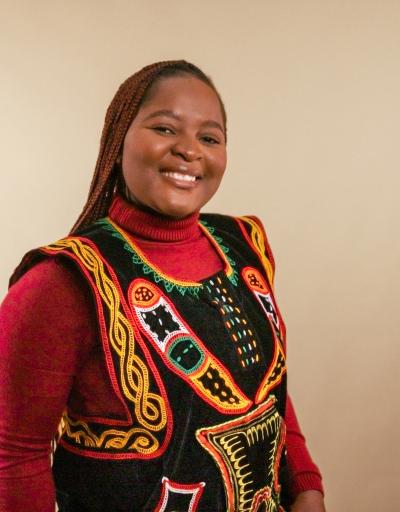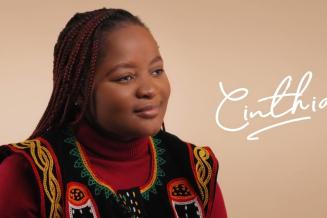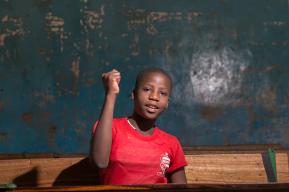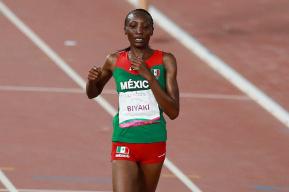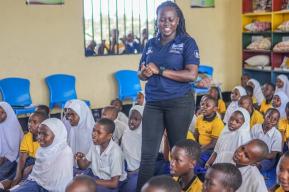According to UNAIDS, of which UNESCO is partner, 5 million people across west and central Africa (WCA) were living with HIV at the end of 2021. Despite progress, 14,800 new HIV infections were recorded in 2022, with girls and young women aged 15-24 being three times more at risk than boys and young men.
Knowledge is power
Having knowledge about HIV and AIDS can help tip the balance and save lives. But among adolescents in WCA, only 24% of boys and 22% of girls aged 15-19 have a comprehensive knowledge about HIV. The levels of transmission coupled with a lack of knowledge have a direct impact on young people’s health and education outcomes in the region.
"I didn't know why, but I had rashes on my body while growing up, and they would come and go”, says Cinthia, who had lost her mother at a young age. Things took a turn in 2014: she started losing weight and her eyes were becoming white. “While I complained to my family, it was only when I couldn't breathe one evening, when my chest felt like it was being ripped apart, that I was rushed to hospital."
Cinthia remained in hospital for several weeks, where she learned news that would change her life: she was HIV positive. "It came to me as a real shock”, says Cinthia. “I had some knowledge of HIV, but I thought you could only be at risk through sexual intercourse, and I was not sexually active.”
Taking on stigma and shame
In her community, Cinthia says that HIV equated death. It meant that there was no hope. "It was tough at first. I felt like my life had been taken away, and my power had been taken away from me as my family told others in the community about my HIV diagnosis.” During that time, she also faced bullying at school, as her peers started to call her specific names.
Cinthia decided to educate herself and get knowledge about HIV: how she could protect herself, protect those around her, and how she could give birth to children and become a mother. “Knowing the causes of my rashes and other side effects, I could protect myself and makes informed choices”, says Cinthia.
This experience has shaped her life and strengthened her commitment to advocacy and educating others in her community. Cinthia created videos and informational content, showing herself as an example of what HIV is and informing others in her community, as well as the world online, without the stigma and shame.
Education saves lives
With a focus on advancing health and education and informed by young people, civil society and countries in the region, UNESCO has been at the forefront of longstanding efforts leading to the endorsement of the WCA Commitment for educated, healthy and thriving adolescents and young people, which addresses topics such as AIDS, health rights and services, early and unintended pregnancy and gender-based violence.
In addressing the need for knowledge and advocacy, UNESCO ran a regional campaign called Education saves lives (L'éducation sauve des vies, in French), which contributed to efforts leading to the WCA Commitment. As part of the campaign, UNESCO worked with Cinthia and other activists to tell young people’s stories and raise awareness on the importance of health and education.
“It was empowering”, says Cinthia. “I saw UNESCO pushing for education and listening to our stories with respect. They believed me. I started to think that maybe people were interested, and that HIV education was crucial. I felt like change was possible in my own country, Cameroon.”
On being asked about the future, she hopes that these three areas of action will bring the change needed:
- Train teachers with the knowledge and tools to teach about HIV from a facts-based lens as a separate subject. They also need guidance on how to speak about the topic.
- Support young people living with HIV. Adolescence and HIV are already a burden. Provide learners with safe and supportive spaces to navigate through the challenges, including on mental health.
- Safeguard the right to education without fear and stigma.
Cinthia has now completed her university education and is continuing her work as an activist. “One of my goals is to become financially independent and stable so that I can make decisions that are healthy, respectful, and kind to myself”, says Cinthia. “It’s high time we speak up. It’s high time we feel free!”
The WCA commitment was endorsed by Ministers of Education and Health of 25 countries in the region and is an important contribution to health, education and gender equality outcomes. Evidence indicates that the Commitment can be critical to improve the health and education of young people in the region.
UNESCO played a central role in the coordination of the multi-year process leading to the endorsement of the Commitment, and is now supporting its implementation. This work included national and regional consultations with young people, civil society and governments, advocacy efforts including the Education saves lives campaign shining a light on young people’s voices and stories, and technical expertise on health and education.


